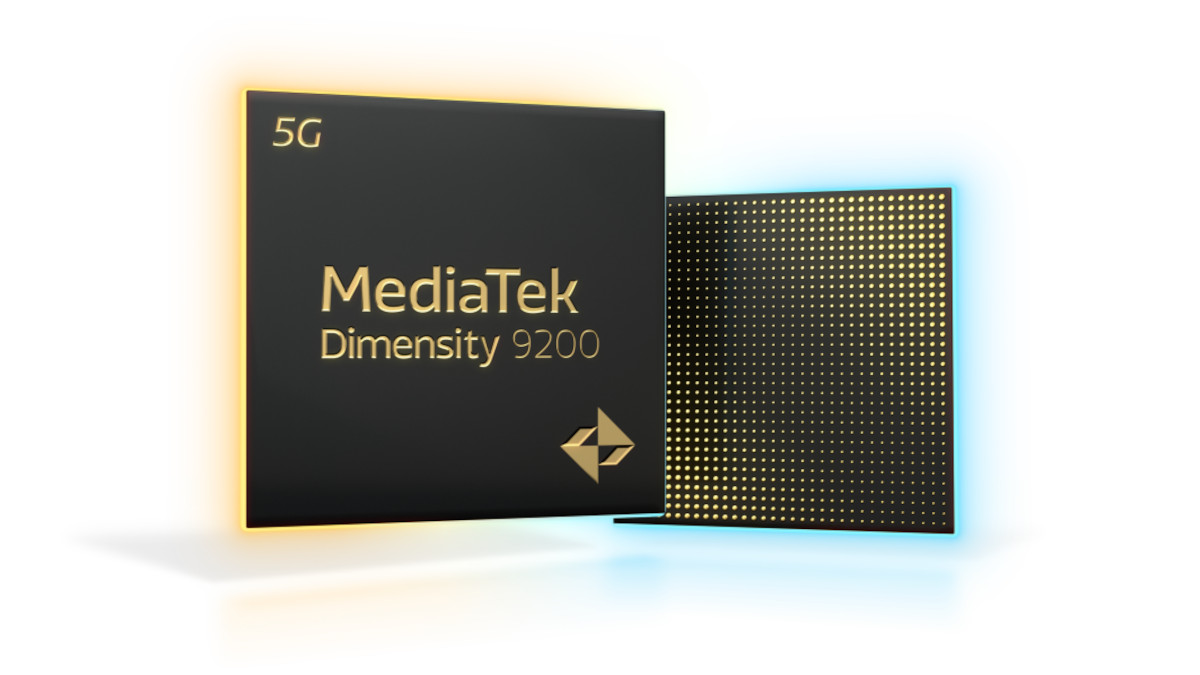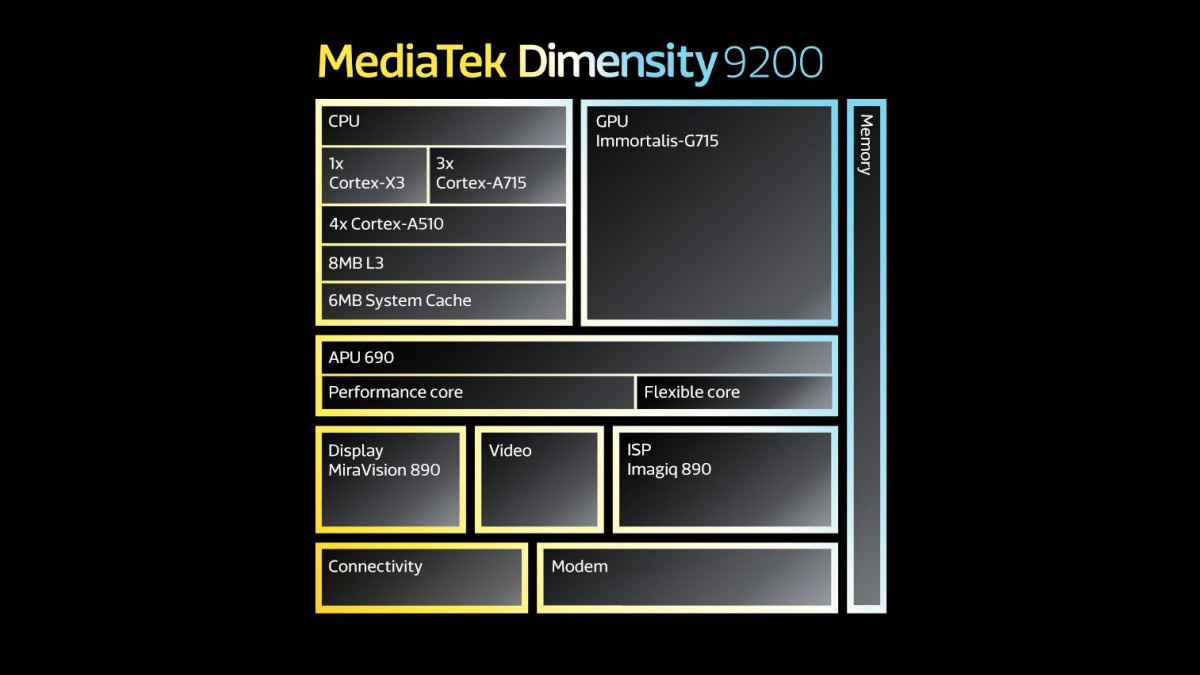
Supplied by Mediatek
Mediatek stepped up its flagship silicon game last year when it announced the Dimensity 9000 processor. This marked the company’s first attempt at a truly cutting-edge chipset to take on Qualcomm’s Snapdragon 8 series.
The company then followed up with the Dimensity 9000 Plus, and we thought the chipset was a great match for the Snapdragon 8 Plus Gen 1. Now, Mediatek has announced the next-generation Dimensity 9200 processor, picking up where the 9000 family left off.
Dimensity 9200: Key specs worth knowing
The Taiwanese chipmaker’s latest high-end SoC is built on a second-generation TSMC 4nm process, and makes full use of Arm’s latest CPU technology. Expect an octa-core CPU here, consisting of one Cortex-X3 heavyweight core (3.05GHz), three Cortex-A715 medium cores (2.85GHz), and four Cortex-A510 lightweight cores (1.8GHz). This is backed up with 8MB of L3 cache and 6MB of system-level cache — in line with last year’s SoC.
Mediatek also confirmed that the Dimensity 9200 is the first 64-bit-only smartphone SoC, which means that 32-bit apps like abandoned games and some niche apps won’t work on phones powered by this processor. This is a different approach to Google and the Pixel 7 series, as the Tensor G2 technically offers 32-bit support but the software itself doesn’t support 32-bit apps.
| MediaTek Dimensity 9200 | Mediatek Dimensity 9000/9000 Plus | |
|---|---|---|
|
CPU |
MediaTek Dimensity 9200
1x Cortex-X3 @ 3.05GHz |
Mediatek Dimensity 9000/9000 Plus
1x Cortex-X2 @ 3.05GHz (3.2GHz for Plus) |
|
GPU |
MediaTek Dimensity 9200
Arm Mali-G715 Immortalis MC11 |
Mediatek Dimensity 9000/9000 Plus
Arm Mali-G710 MC10 |
|
Display |
MediaTek Dimensity 9200
240Hz at FHD+
144Hz at WQHD |
Mediatek Dimensity 9000/9000 Plus
180Hz at FHD+ |
|
Machine learning |
MediaTek Dimensity 9200
APU 6.0 |
Mediatek Dimensity 9000/9000 Plus
APU 5.0 |
|
Modem |
MediaTek Dimensity 9200
Helio M80 architecture |
Mediatek Dimensity 9000/9000 Plus
Helio M80 architecture |
|
Camera |
MediaTek Dimensity 9200
TBC |
Mediatek Dimensity 9000/9000 Plus
320MP single |
|
Process |
MediaTek Dimensity 9200
4nm (TSMC N4P) |
Mediatek Dimensity 9000/9000 Plus
4nm (TSMC N4) |
What should you expect in terms of performance, then? The company is claiming a 12% boost in single-core scores in the GeekBench 5 benchmark test, as well as a 10% boost to multi-core scores. Furthermore, Mediatek says you can expect 25% less power consumption for the same performance as the Dimensity 9000.
The chipmaker also claims to have improved its heat dissipation capability by 10%, adding that it’s able to delay temperature rise times by 4x compared to last year’s processor (when going from 20 degrees Celsius to 95 degrees Celsius).We’ll have to spend time with commercial devices to determine whether these improvements bear out in the real world.
GPU: Hardware-based ray tracing is here
The Dimensity 9200 offers an Arm Mali-G715 Immortalis MC11 GPU as well, with the company claiming a 32% boost in Manhattan 3.0 benchmark scores over the previous SoC. The firm also says you can expect a 41% reduction in power for the same performance.
However, this GPU also enables Mediatek to offer hardware-accelerated ray tracing support for the first time. This makes for more realistic reflections and shadows in games that support the tech.
The Dimensity 9200 joins Samsung’s Exynos 2200 in offering hardware-based ray tracing support.
Of course, the Samsung Exynos 2200 seen in European Galaxy S22 models offers hardware-based ray tracing too, but we didn’t actually see any games that support it. Fortunately, Mediatek told us during a Q&A that the first games to support the Dimensity 9200’s ray tracing capabilities will launch in H1 2023, albeit without revealing specific titles.
The Dimensity 9200 GPU also supports features like variable rate shading, Vulkan 1.3, and the HyperEngine 6.0 suite of gaming features. The latter includes motion blur reduction, improved touch response, and better resource management.
Camera support
Mediatek is also bringing camera improvements courtesy of its Imagiq 890 image signal processor (ISP). The company says it’s using AI tech to understand what’s in the foreground and the background of a scene (e.g. people, ocean, sky), then tuning saturation and color accordingly.
The chipmaker is also aiming to tackle blurry photos with dual stream AI shutter tech, using two camera streams (one for short exposures and one for long exposures) and fusing them to reduce blur.
The firm is also claiming native support for RGBW camera sensors as well as 12.5% power savings when recording 8K/30fps video with electronic stabilization.
What else should you know?

Supplied by Mediatek
The Dimensity 9200 is also Mediatek’s first flagship processor with mmWave 5G support thanks to the M80-based modem aboard, topping out at 7.9Gbps downlink speeds. The modem also offers 8CC for mmWave, 4CC for sub-6GHz 5G, and the firm’s 5G UltraSave 3.0 solution.
Moving to AI, Mediatek is bringing its APU 690 sixth-generation machine learning silicon, touting 18% faster peak clock speeds and a 30% boost to power efficiency.
Mediatek Dimensity 9200: Hot or not?
165 votes
Other notable features include Bluetooth 5.3, 240Hz refresh rate at FHD+ resolutions, 144Hz at WQHD resolution, LPDDR5X RAM support at 8,533Mbps, UFS 4.0 storage support, and Wi-Fi 7 capabilities (“Wi-Fi 7 ready”).
The first Dimensity 9200-powered smartphones will be available by the end of 2022. We’re not sure if these first devices will actually be available in global markets or in China only, but Mediatek told journalists that Dimensity 9200 phones would be “more broadly available” than Dimensity 9000 devices.



